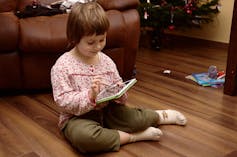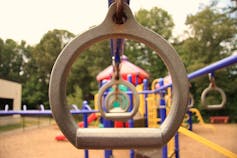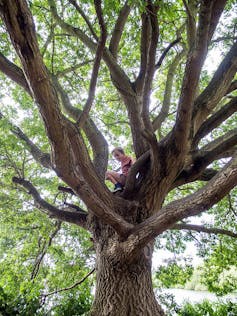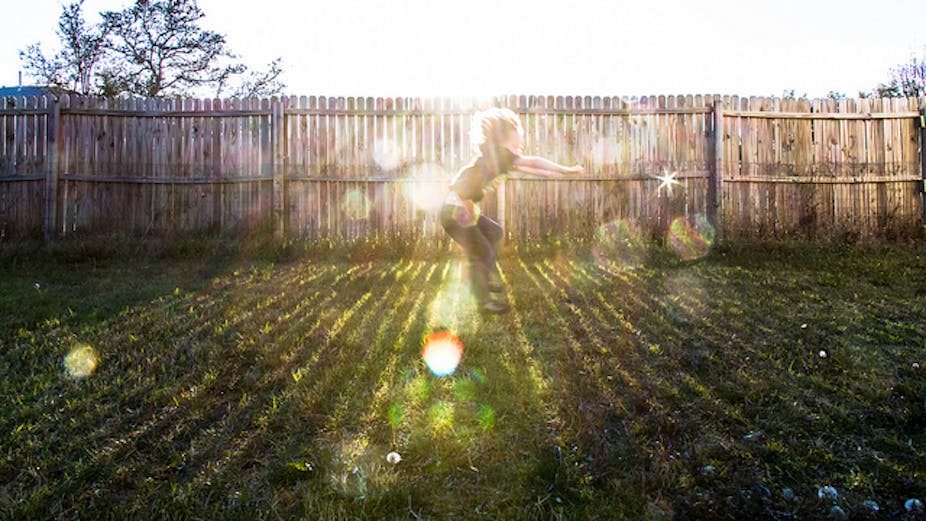Parents are often told they need to get their kids outside to play to combat childhood obesity - which is more widespread than ever. But outside play isn’t only important in combating childhood obesity. And too much “screen time” does more than just make our kids fat.
Too much screen time

Spending prolonged periods in front of screens isn’t only bad for weight management in kids, it has also been shown to be detrimental to cognitive development, psychological health and sleep.
A smorgasbord of studies points to more than two hours of screen time per day as the perfect recipe for a fat and unhappy child (see here, here and here).
More play time has benefits beyond the waistline
What is less well known is the cognitive and psychological benefits of physically active play.
From a psychological perspective, children get a kick out of feeling effective and in control of themselves in their surroundings. (Remember the look of glee on your child’s face when they took their first steps, mastered a puzzle, first kicked a footy?) Most also prefer to exercise free will in choosing activities that appeal to them.
These two crucial factors in building psychological well-being are referred to by psychologists as “competence” and “autonomy”.

Providing play opportunities that increase physical activity, alongside promoting both competence and autonomy, will result in genuine skill development, as well as creating an enhanced sense of self-efficacy and psychological well-being.
Sounds so simple! Enter the barrier to providing said play opportunities: the fearful and risk-averse parent, strongly backed by Australia’s litigious compensation schemes.
But are parental fears of harm and injury justified? The notoriously reckless researcher Professor Paul Tranter introduced children to a “playground” filled with ropes, 44-gallon drums, milk crates and all manner of certain death traps. The result? A reduction in fighting and bullying and, interestingly, an increase in the social status of the creative kids.
Not to be outdone, our Kiwi cousins banned playground “rules” in several primary schools. Kids were allowed to climb trees, negotiate play and choose their own adventure. Their results? A similar reduction in bullying, as well as a drop in vandalism and serious injuries. I repeat, a drop in serious injuries.
Why? Because the kids are learning self-discipline and self-control, taking personal responsibility for their own risk and ability evaluation, thereby increasing autonomy and competence.
In stark comparison, what are we doing in Australia? Imposing increasingly absurd safety “interventions” like banning kids from doing cartwheels, which drives down both autonomy and competence in one fell swoop.
At a seminar of landscape architects I recently attended, we had the obligatory presentation from the fun police, trawling through the meticulous safety standards for playgrounds in Australia. He noted a key difference between Australia and New Zealand is litigation (or lack thereof) in response to playground/sporting injury (long story short, NZ residents are covered by an insurance scheme that doesn’t rely on lawsuits). He quipped that it was no wonder the All Blacks are such an unbeatable rugby team:
If you can survive a New Zealand playground, you can go onto achieve anything.
He doesn’t know how right he is.

The architects were particularly interested in the benefits of nature play. Why? Because, as yet, you can’t sue a tree. Therefore nature remains the last bastion of genuine challenge; where children can test their effectiveness (competence) in a real rather than a sanitised, hyper-protected and restricted play environment.
If we withhold from our children the ability to take risks, evaluate consequences, innovate and solve problems in the face of challenge or failure, how on earth can we expect them to develop into effective, successful adults?
We should realise the damage we are doing to our kids by stifling and sanitising every possible play experience, as well as the legal processes we have in place to support this.
If not for me, if not for your child, at least for the future of Australian rugby!

